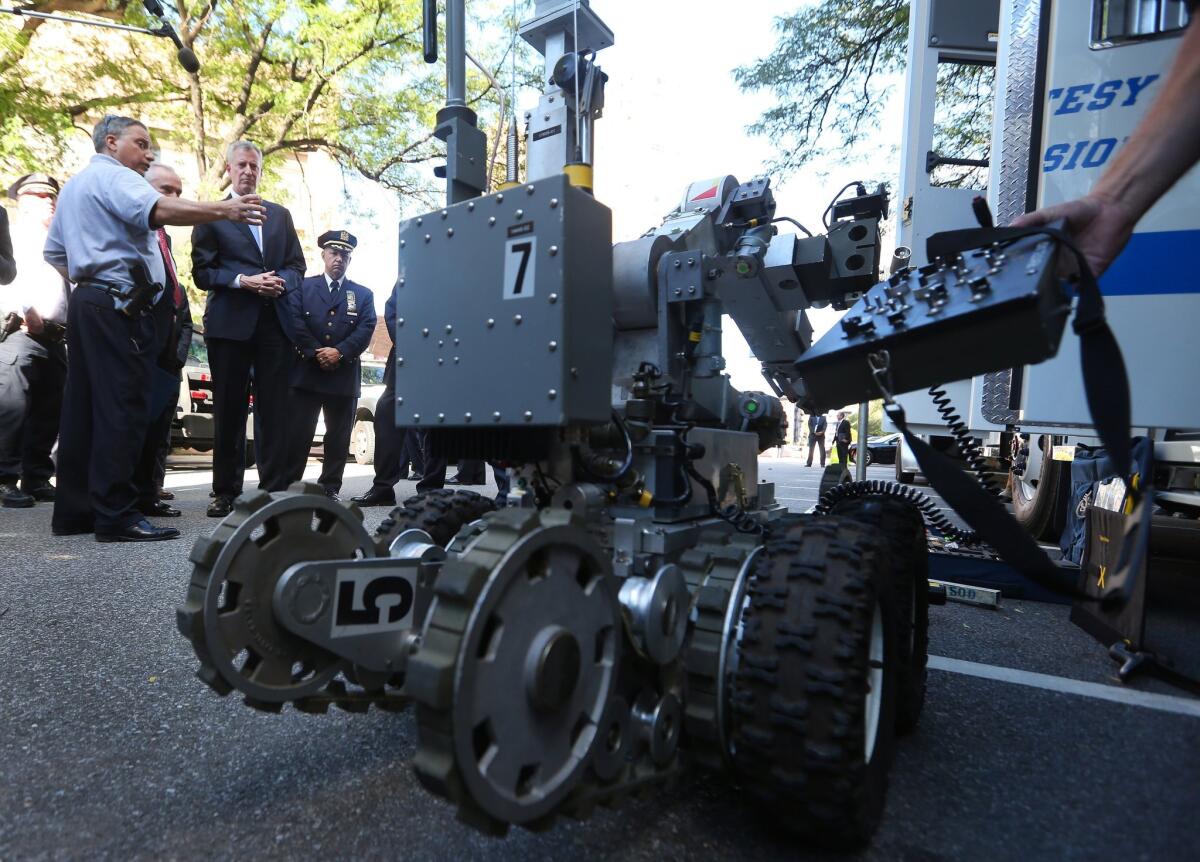New York security challenge: Pope Francis, United Nations -- and Beyonce

New York City Mayor Bill de Blasio and NYPD Commissioner William J. Bratton inspect special security equipment that will be available during next week’s visit by Pope Francis. The city also will host 170 world leaders for the United Nations General Assembly and a free Beyonce concert in Central Park.
- Share via
Reporting from New York — It wasn’t yet noon, but police and federal agents already were chasing reports of two active shooters, a power outage and a building collapse. Within the hour, there would be two bomb blasts and a not-so-funny joke that an asteroid was headed straight for Manhattan.
None of this was real, but as New York prepares to play host to quite literally the world, from Pope Francis to 170 heads of state to Beyonce, security officials are bracing for everything.
The exercise Monday, at which emergency officials responded to various ghastly scenarios thrown their way, was part of the planning underway in advance of Francis’ arrival Sept. 24 from Washington. His visit overlaps with the annual United Nations General Assembly, which most of the world’s leaders are expected to attend. The pope will address the gathering the day after he arrives.
Topping it off, on Sept. 26, the day the pontiff leaves New York for Philadelphia, Beyonce will perform at a free concert in Central Park, along with Coldplay, Pearl Jam and other acts expected to draw tens of thousands of people.
“We believe that this event is going to be the largest security challenge that the department and this city have ever faced,” New York’s police commissioner, William J. Bratton, said at a briefing Monday, referring to the papal visit, the U.N. gathering and the concert.
Mayor Bill de Blasio agreed. “When you combine them, we can safely say we have literally never seen something like this before, and we welcome it,” he said. “We embrace it. We look forward to it.”
De Blasio and Bratton spoke in a courtyard outside police headquarters, and they were joined by officials from the FBI, the Secret Service and other agencies who earlier had undergone the drills, complete with the fake asteroid warning, aimed at preparing them for the worst.
Police vehicles equipped with radiation- and explosive-detection devices sat behind them, part of a display aimed at showing off the breadth of efforts intended to keep Francis and everyone else here safe.
Those overseeing the effort admit that it is a delicate balance, ensuring tight security while accommodating a pope famous for his desire to be approachable. The year after his 2013 election, Francis told a Spanish newspaper that he did not like using the bulletproof popemobile, which he called a “sardine can” that prevented him from being close to people.
“It is true that anything could happen, but let’s face it, at my age I don’t have much to lose,” the pontiff, who is 78, told the Barcelona newspaper La Vanguardia in June 2014. The popemobile came into use after a 1981 assassination attempt against Pope John Paul II, who was shot and seriously wounded as he was being driven through St. Peter’s Square.
Security officials have released a long list of no-nos for people who have tickets for the various papal events, which include a Mass at Madison Square Garden and a procession through Central Park.
More than 93,000 New Yorkers entered the lottery for the park procession tickets alone; 80,000 won two free tickets each.
Among the 23 items prohibited from papal events are selfie sticks, toy guns, balloons, bicycles, and animals other than service pets. Pilgrims better pray for good weather, because umbrellas are also on the list. Drones and radio-controlled model airplanes are banned from operating anywhere over New York City from Sept. 24 through Sept. 30.
There will be dozens of street closures.
The exercise conducted Monday morning was prepared by the U.S. Department of Homeland Security, one of nearly 50 local, state and federal agencies involved in securing the papal visit. The Secret Service is the lead agency.
In the demonstration, large screens showed city streets buzzing with traffic. Then, one screen began showing a series of catastrophic events unfolding, one after another.
“The idea is we can see the stretching of our resources,” said John J. Miller, the NYPD’s deputy commissioner for intelligence and counter-terrorism.
In some of the envisioned scenarios, SWAT teams might be deployed. In others, bomb-detecting robots.
Later, De Blasio was shown the high-tech equipment that will be part of the security apparatus at the ready, including an armored vehicle known as a BearCat, a collection of long guns and a robot whose articulated arm can tear open packages that might contain explosives. De Blasio also spent time with low-tech elements – two bomb-sniffing dogs named Stryker and Nox, who underwent more than 15 months of training.
For all the security planning, there was one thing officials could not prevent: greed. The free tickets issued for papal events quickly began showing up for sale online. Some sellers on Craigslist were offering their tickets for just $1 or free, but many were seeking up to $500 per ticket.
One person sought $2,000 for four tickets to see the pope in Philadelphia on Sept. 26. “Don’t miss out on this once in a lifetime experience to see and hear Pope Francis while he’s in Philadelphia! 100% authentic tickets, be part of history in the making!!” the ad read.
De Blasio called the attempted profiteering “truly disturbing.”
“It’s absolutely inconsistent with everything the pope stands for,” he said of the ticket sales.
Twitter: @tinasusman
More to Read
Sign up for Essential California
The most important California stories and recommendations in your inbox every morning.
You may occasionally receive promotional content from the Los Angeles Times.














